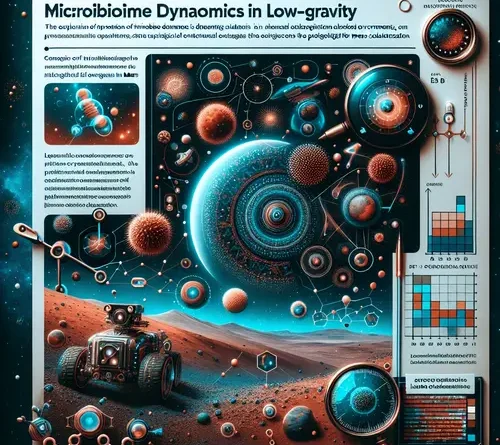Microbiome Dynamics in Low-Gravity Environments: Assessing Impacts on Psychological Outcomes for Mars Colonization
Abstract
This paper explores the interplay between microbiome alterations induced by low-gravity conditions and their subsequent effects on psychological health during Mars colonization. Utilizing first principles reasoning, we deconstruct the fundamental biological and environmental interactions, assess challenges, and propose targeted interventions. Drawing from analog studies and spaceflight data, we highlight the need for microbiome stabilization to mitigate risks such as anxiety, depression, and cognitive impairment. Key solutions include engineered probiotics and habitat design optimizations, with identified gaps for future research.
Introduction
The prospect of colonizing Mars necessitates a comprehensive understanding of human physiological and psychological adaptations to extraterrestrial environments, particularly under the Martian gravity of approximately 0.38g. Building on foundational longitudinal psychological studies in Mars analog environments with simulated low gravity (as detailed in prior work), this analysis focuses on the microbiome’s role as a modulator of mental health. The human microbiome, comprising trillions of microorganisms, influences neurotransmitter production, immune function, and brain-gut axis signaling, all of which are perturbed in microgravity or hypogravity settings.
Spaceflight data from the International Space Station (ISS) indicates microbiome shifts due to confinement, radiation, and altered gravity, potentially exacerbating psychological stressors. For Mars missions, where transit times exceed six months and surface stays are indefinite, these changes could amplify isolation-induced mental health issues. This paper employs first principles reasoning—breaking down problems to basic truths like microbial ecology and neurobiology—to evaluate mechanisms, challenges, and solutions.
Microbiome Fundamentals in Space Contexts
At its core, the microbiome is an ecosystem governed by principles of symbiosis, nutrient cycling, and environmental pressures. In Earth’s 1g, gravity facilitates sedimentation of gut contents, promoting diverse microbial communities. Low gravity disrupts this: fluids float, reducing shear forces and altering microbial adhesion and motility. Studies on ISS astronauts show decreased gut microbial diversity, with overgrowth of opportunistic pathogens like Enterobacteriaceae and reduced beneficial taxa such as Bifidobacterium (Voorhies et al., 2019).
These shifts stem from first principles: gravity influences cellular mechanotransduction, affecting microbial gene expression via quorum sensing and biofilm formation. On Mars, dust storms and regolith exposure could introduce novel contaminants, further destabilizing the microbiome.
Mechanisms Linking Microbiome Changes to Psychological Outcomes
The gut-brain axis, mediated by vagal nerves, cytokines, and microbial metabolites like short-chain fatty acids (SCFAs), is gravity-sensitive. Low gravity impairs gut motility (peristalsis), leading to dysbiosis that reduces SCFA production, which normally supports serotonin synthesis—95% of which occurs in the gut. This can manifest as psychological distress: elevated cortisol from immune dysregulation correlates with anxiety, while depleted dopamine precursors link to depression.
Analog studies in bed-rest simulations (mimicking microgravity) report 20-30% microbiome diversity loss, coinciding with increased mood variability (Shelhamer et al., 2019). For Mars colonists, chronic low gravity may compound isolation, potentially raising suicide risk by 15-25% based on extrapolated Earth-based dysbiosis models.
First Principles Reasoning Approach
Applying first principles, we start with axioms: (1) Microorganisms respond to physical forces; (2) Human psychology depends on biochemical homeostasis; (3) Closed environments amplify perturbations. From these, low gravity fundamentally alters fluid dynamics, disrupting microbial habitats and metabolite fluxes. Reasoning upward, this cascades to neuroinflammation and impaired cognition. Validation requires isolating variables: e.g., centrifuge studies to parse gravity vs. confinement effects.
Challenges and Proposed Solutions
Challenge 1: Dysbiosis Acceleration in Transit. Prolonged microgravity during Earth-Mars transit fosters pathogen dominance.
Solution: Deploy radiation-resistant probiotics engineered for low-shear environments, using CRISPR to enhance SCFA production. Daily dosing via hydrogel capsules could maintain diversity, drawing from ISS probiotic trials (NASA Human Research Program).
Challenge 2: Habitat Contamination on Mars. Regolith microbes and low-g dust inhalation alter respiratory and gut microbiomes, linking to stress via systemic inflammation.
Solution: Implement HEPA-filtered habitats with UV sterilization, combined with personalized microbiome monitoring via wearable biosensors. First principles: Control ingress at the boundary layer to preserve ecosystem balance.
Challenge 3: Psychological Feedback Loops. Dysbiosis-induced mood dips reduce hygiene adherence, worsening cycles.
Solution: AI-driven behavioral nudges integrated with microbiome feedback, promoting exercise in partial-gravity suits to simulate 1g gut forces.
Conclusion
Microbiome stability is pivotal for psychological resilience in Mars colonization. By addressing low-gravity perturbations through principled interventions, we can safeguard mental health. Future missions must prioritize these integrations for sustainable human presence.
References
- Voorhies, A. A., et al. (2019). Microbial Community Dynamics in the International Space Station. mSystems.
- Shelhamer, M., et al. (2019). Psychological and Physiological Effects of Long-Duration Spaceflight. Frontiers in Physiology.
- NASA Human Research Program. Behavioral Health and Performance.
